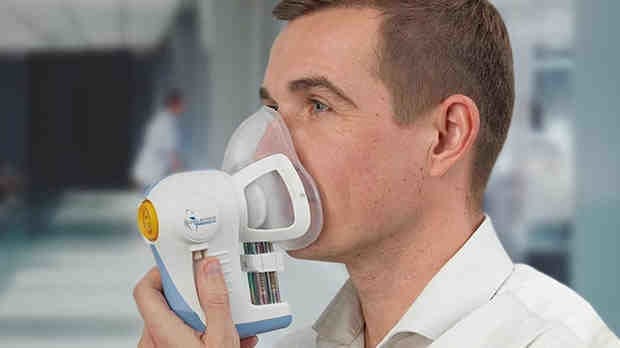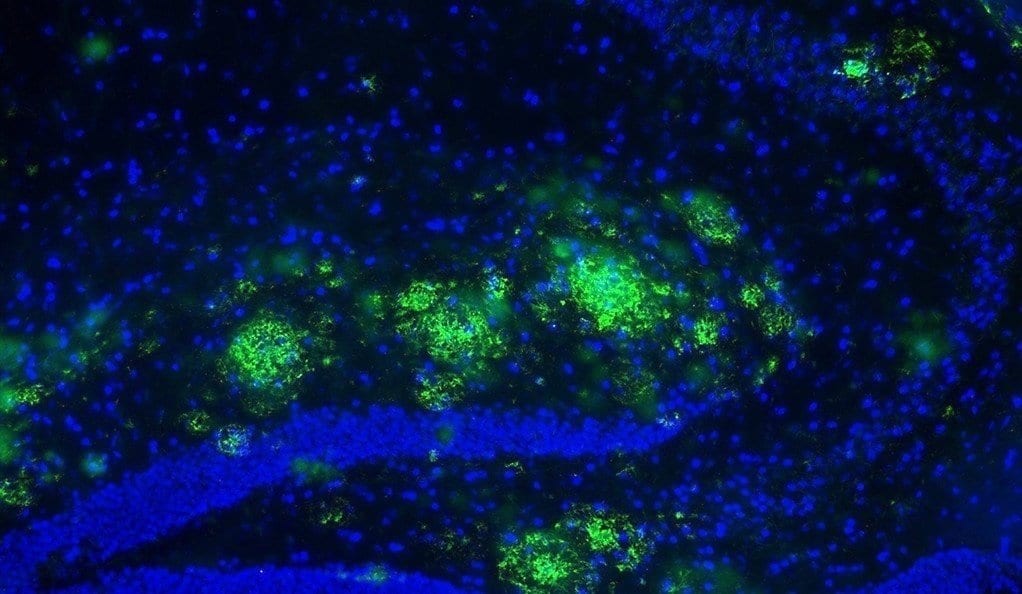
Researchers have launched a clinical trial to develop a breath test, analysing molecules that could indicate the presence of cancer at an early stage.
[This] technology is the first to test across multiple cancer types, potentially paving the way for a universal breath test. – Professor Rebecca Fitzgerald
This is the first test of its kind to investigate multiple cancer types.
A cancer breath test has huge potential to provide a non-invasive look into what’s happening in the body and could help to find cancer early, when treatment is more likely to be effective.
The Cancer Research UK Cambridge Centre is running the PAN Cancer trial for Early Detection of Cancer in Breath* in collaboration with Owlstone Medical** to test their Breath Biopsy® technology.
Breath samples from people will be collected in the clinical trial to see if odorous molecules called volatile organic compounds (VOCs) can be detected.
Professor Rebecca Fitzgerald, lead trial investigator at the Cancer Research UK Cambridge Centre, said: “We urgently need to develop new tools, like this breath test, which could help to detect and diagnose cancer earlier, giving patients the best chance of surviving their disease.
“Through this clinical trial we hope to find signatures in breath needed to detect cancers earlier – it’s the crucial next step in developing this technology. Owlstone Medical’s Breath Biopsy® technology is the first to test across multiple cancer types, potentially paving the way for a universal breath test.”
When cells carry out biochemical reactions as part of their metabolism they produce a range of VOCs. If their metabolism becomes altered, such as in cancer and various other conditions, cells can release a different pattern of VOCs. The researchers aim to identify these patterns using Owlstone Medical’s Breath Biopsy® technology.
The researchers in the trial will collect samples from 1,500 people, including healthy people as trial controls, to analyse VOCs in the breath to see if they can detect signals of different cancer types. The clinical trial will start with patients with suspected oesophageal and stomach cancers and then expand to prostate, kidney, bladder, liver and pancreatic cancers in the coming months.
The trial is recruiting patients to Addenbrooke’s Hospital in Cambridge who have been referred from their GP with these specific types of suspected cancer. They will be given the breath test prior to other diagnostic tests. Patients will breathe into the test for 10 minutes to collect a sample, which will then be processed in Owlstone Medical’s Breath Biopsy laboratory in Cambridge, UK.
By looking across cancer types, this trial will help unpick if cancer signals are similar or different, and how early it’s possible to pick these signals up. Some people will go on to be diagnosed with cancer, and their samples will be compared to those who don’t develop the disease.
If the technology proves to accurately identify cancer, the team hope that breath biopsies could in future be used in GP practices to determine whether to refer patients for further diagnostic tests.
Billy Boyle, co-founder and CEO at Owlstone Medical, said: “There is increasing potential for breath-based tests to aid diagnosis, sitting alongside blood and urine tests in an effort to help doctors detect and treat disease. The concept of providing a whole-body snapshot in a completely non-invasive way is very powerful and could reduce harm by sparing patients from more invasive tests that they don’t need.
“Our technology has proven to be extremely effective at detecting VOCs in the breath, and we are proud to be working with Cancer Research UK as we look to apply it towards the incredibly important area of detecting early-stage disease in a range of cancers in patients.”
Almost half of cancers are diagnosed at a late stage in England***. This highlights the importance of early detection, particularly for diseases like oesophageal cancer where only 12% of oesophageal cancer patients survive their disease for 10 years or more.
Rebecca Coldrick, 54 from Cambridge, was diagnosed in her early 30s with Barrett’s oesophagus, a condition where the cells lining the oesophagus are abnormal – often caused by acid reflux. Out of 100 people with Barrett’s oesophagus in the UK, up to 13 could go on to develop oesophageal adenocarcinoma****.
Rebecca Coldrick said: “About 20 years ago I developed acid reflux, and I began to live on Gaviscon and other indigestion remedies. I went to the doctors and shortly after I was diagnosed with Barrett’s. Every two years I have an endoscopy to monitor my condition.”
Monitoring patients to find those at high risk of developing a cancer, like oesophageal, is very intrusive for patients, who may not even develop the disease. Rebecca Coldrick decided to take part in the PAN Cancer trial for Early Detection of Cancer in Breath. A non-invasive test using this technology could help to further differentiate those likely to develop oesophageal cancer from those less likely to develop the disease.
She added: “I was very happy to take part in the trial and I want to help with research however I can. Initially, I thought I might feel a bit claustrophobic wearing the mask, but I didn’t at all. I found watching the display on the computer during the test interesting and soon we were done, without any discomfort.
“I think the more research done to monitor conditions like mine and the kinder the detection tests developed, the better.”
Dr David Crosby, head of early detection research at Cancer Research UK, said: “Technologies such as this breath test have the potential to revolutionise the way we detect and diagnose cancer in the future.
“Early detection research has faced an historic lack of funding and industry interest, and this work is a shining example of Cancer Research UK’s commitment to reverse that trend and drive vital progress in shifting cancer diagnosis towards earlier stages.”
Recognising the importance of early detection in improving cancer survival, Cancer Research UK has made research into this area one of its top priorities and will invest more than £20 million a year in early detection research by 2019.
The Latest on: Cancer breath test
[google_news title=”” keyword=”cancer breath test” num_posts=”10″ blurb_length=”0″ show_thumb=”left”]
via Google News
The Latest on: Cancer breath test
- Owlstone secures $6.5M for breath-based diagnostics for infectious diseaseon April 26, 2024 at 5:40 am
Owlstone Medical has secured a $5 million equity investment and initial $1.5 million grant funding, committed by the Bill and Melinda Gates Foundation, for development of breath-based diagnostic ...
- Survey: Most Americans Have Never Had Their Homes Tested for Radon, a Leading Cause of Lung Canceron April 24, 2024 at 10:33 am
Radon is one of the leading causes of lung cancer. But a new survey found most Americans haven't had their homes tested for the dangerous gas, and more than half aren't concerned about radon exposure ...
- Olivia Munn Says the ‘Silliest Moments’ With Son Malcolm ‘Lifted Me Up’ During Breast Cancer Battleon April 23, 2024 at 11:43 am
Olivia Munn said the ‘smallest, silliest moments’ with her son, Malcolm, were a welcome relief during her breast cancer battle ...
- FSSAI doesn’t permit use of ethylene oxide in any food product. Nutritionist explains how it harms the bodyon April 23, 2024 at 3:28 am
“Ethylene oxide is a pesticide that has been classified as a Group 1 carcinogen by the International Agency for Research on Cancer, meaning there is sufficient evidence from human studies that it can ...
- How Olivia Munn's Doctor Saved Her Own Life with Mastectomy That Caught Cancer Tests Missed (Exclusive)on April 21, 2024 at 5:31 am
GYN, Dr. Thaïs Aliabadi, shares her own cancer journey with PEOPLE and why she’s made it her mission to educate women to advocate for themselves inside the healthcare system.
- Colon cancer rates are rising in young people. If you have two symptoms you should get a colonoscopy, a GI oncologist says.on April 18, 2024 at 8:41 am
Cases of colon cancer have risen in younger people by 2% a year since 2011. Knowing the signs and symptoms is crucial for catching it early.
- 'Cancer doesn't care who you are': Olivia Munn opens up about 'tough' mastectomy and a risk tool that 'saved' her lifeon April 17, 2024 at 7:52 am
Olivia Munn is sharing more about her recent battle with breast cancer that lead to a double mastectomy and medically induced menopause. The actress recently opened up to People in an exclusive ...
- Olivia Munn’s ‘Terrifying’ Breast Cancer Diagnosis After Baby Joy: 4 Surgeries in 10 Months, and Medically Induced Menopause (Exclusive)on April 17, 2024 at 5:04 am
Olivia Munn opens up to PEOPLE about her double mastectomy, leaning on partner John Mulaney for support during her months-long recovery, and what she wants women to know about preventing breast cancer ...
- Could breath analysis help with gut issues?on April 15, 2024 at 2:07 am
Through OMED Health, Owlstone can supply breath tests for SIBO and food intolerances to people across the UK for just £250. This service includes guidance from an associated consultant specialist who ...
- Radon exposure associated with concerning rise in non-smoking lung canceron April 12, 2024 at 2:46 pm
Although lung cancer is traditionally thought of as a "smoker's disease," a surprising 15-20% of newly diagnosed lung cancers occur in people who have never smoked, many of whom are in their 40s or ...
via Bing News










